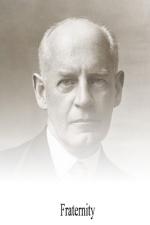“It’s an east wind, father; aren’t you terribly cold without a fire?”
Mr. Stone came from his writing-desk, and stood so that light might fall on a sheet of paper in his hand. Cecilia noted the scent that went about with him of peat and baked potatoes. He spoke:
“Listen to this: ’In the condition of society, dignified in those days with the name of civilisation, the only source of hope was the persistence of the quality called courage. Amongst a thousand nerve-destroying habits, amongst the dramshops, patent medicines, the undigested chaos of inventions and discoveries, while hundreds were prating in their pulpits of things believed in by a negligible fraction of the population, and thousands writing down today what nobody would want to read in two days’ time; while men shut animals in cages, and made bears jig to please their children, and all were striving one against the other; while, in a word, like gnats above a stagnant pool on a summer’s evening, man danced up and down without the faintest notion why—in this condition of affairs the quality of courage was alive. It was the only fire within that gloomy valley.’” He stopped, though evidently anxious to go on, because he had read the last word on that sheet of paper. He moved towards the writing-desk. Cecilia said hastily:
“Do you mind if I shut the window, father?”
Mr. Stone made a movement of his head, and Cecilia saw that he held a second sheet of paper in his hand. She rose, and, going towards him, said:
“I want to talk to you, Dad!” Taking up the cord of his dressing-gown, she pulled it by its tassel.
“Don’t!” said Mr. Stone; “it secures my trousers.”
Cecilia dropped the cord. ‘Father is really terrible!’ she thought.
Mr. Stone, lifting the second sheet of paper, began again:
“’The reason, however, was not far to seek—–”
Cecilia said desperately:
“It’s about that girl who comes to copy for you.”
Mr. Stone lowered the sheet of paper, and stood, slightly curved from head to foot; his ears moved as though he were about to lay them back; his blue eyes, with little white spots of light alongside the tiny black pupils, stared at his daughter.
Cecilia thought: ‘He’s listening now.’
She made haste. “Must you have her here? Can’t you do without her?”
“Without whom?” said Mr. Stone.
“Without the girl who comes to copy for you.”
“Why?”
“For this very good reason—–”
Mr. Stone dropped his eyes, and Cecilia saw that he had moved the sheet of paper up as far as his waist.
“Does she copy better than any other girl could?” she asked hastily.
“No,” said Mr. Stone.
“Then, Father, I do wish, to please me, you’d get someone else. I know what I’m talking about, and I—–” Cecilia stopped; her father’s lips and eyes were moving; he was obviously reading to himself.




